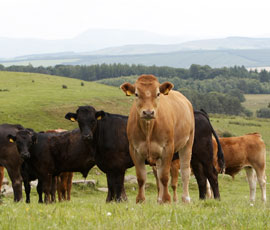Survey shows better results for Scottish livestock

Profitability of beef and sheep production in Scotland improved during 2010 from the previous year despite rising costs, according to Quality Meat Scotland.
Results of its Scottish calf and lamb crop survey, published at last week’s AgriScot event, showed strong technical performance and good cost control enabled many producers to improve profitability.
Across the suckler herds surveyed for example, variable costs per kilo of calf reared for the top third of producers were typically 23% lower than average and fixed costs were also lower (see table). Non-LFA suckler herds reported an average gross margin of £247 a cow while those in the top-third achieved £385. This improvement was due to 7% greater sale weight per cow and a 15% saving in variable costs due to reduced use of concentrates and fertilisers.
The top third of sheep producers also achieved strong performance, with 10-20% more lambs reared per 100 ewes. Apart from lowland flocks where lamb weights were little different, those in the top third typically sold lambs 2kg heavier than average.
But the figures highlighted the difficulties faced by even the most efficient producers and continued importance of subsidies, as net margins for many enterprise types were left in the red after fixed costs were included.
“While the increased prices have helped all producers improve their profitability, or in many cases before subsidy, decrease their losses, it is those concentrating on increasing performance that are in the perfect place to take advantage,” Stuart Ashworth, QMS head of economics said.
QMS costings | ||||||
£/head | Gross margin | Fixed costs | Net margin | |||
Av | Top third | Av | Top third | Av | Top third | |
LFA hill suckler | 205 | 333 | 392 | 430 | -187 | -97 |
Non-LFA suckler | 247 | 385 | 326 | 280 | -79 | 105 |
Rearer-finisher | 301 | 400 | 441 | 421 | -140 | -22 |
Cereal-based finishing | 115 | 218 | 65 | 71 | 50 | 147 |
LFA hill breeding flock | 29 | 49 | 35 | 40 | -6 | 9 |
LFA upland flocks | 64 | 86 | 45 | 49 | 19 | 37 |
Lowland breeding flocks | 62 | 80 | 45 | 46 | 17 | 34 |
